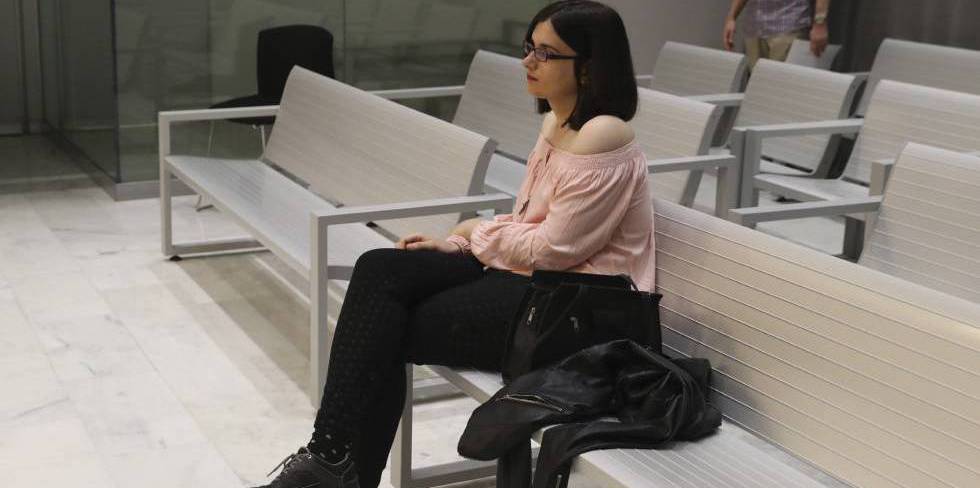Spanish court throws out jail sentence for woman who posted jokes on Twitter
Student Cassandra Vera was given a year in prison over tweets poking fun at the Franco-era assassination of Prime Minister Luis Carrero Blanco
Madrid

Cassandra during her High Court trial. BALLESTEROS EFE
Spain’s Supreme Court has thrown out a jail sentence for Cassandra Vera Paz, a young woman from Murcia who, between 2013 and 2016, published 13 tweets making jokes about the 1973 murder of a Spanish prime minister. The court has thus reversed the sentence handed down in March 2017 by the High Court, which saw her receive a year in jail (suspended) for the offense of glorification of terrorism for humiliating the victims.
I am frightened by a society where freedom of speech can mean a jail termLUCÍA CARRERO-BLANCO, GRANDDAUGHTER OF ASSASSINATED PRIME MINISTER
In its ruling, the Supreme Court found that repeating well-known jokes in bad taste about an attack that happened 44 years ago, without any abusive comments toward the victim, “is socially and even morally reprehensible in terms of mocking a serious human tragedy,” but “a penal sanction is not proportionate.”
Admiral Luis Carrero Blanco, a prime minister during the final years of the regime of Spanish dictator General Francisco Franco, was killed when an activist from Basque terrorist group ETA set off a bomb as his car passed through a narrow street in downtown Madrid on the morning of December 20, 1973. The explosion sent his vehicle 35 meters in the air, over a building and into the patio of a convent.
Vera, who describes herself on Twitter as a radical feminist, a transgender girl and a student of history, posted some 13 tweets between late 2013 and early 2016 about the assassination of Carrero Blanco, one of which read: “ETA launched a policy against official cars combined with a space program.” Another featured the date “20D” next to an image that a public prosecutor described as “an astronaut with the face of Admiral Carrero Blanco on what appears to be the surface of the moon and the Spanish flag of the dictatorship.”
Vera immediately responded to the news of the Supreme Court ruling via Twitter. “I’m very happy on a personal level to see the end of a judicial ordeal that no one should have to go through. But I’m very worried about other sentences, such as that of Valtonyc and other rappers and tweeters.”
Vera was referring to a recent case that saw a Spanish rapper José Miguel Arenas, known by his artistic name Voltonyc, sentenced to three years in jail for slander against the Crown, glorifying terrorism and making threats in a series of songs. Given that the jail term is over three years, Arenas is likely to see the inside of a prison cell, after the ruling was upheld by the Supreme Court.
“We will continue to fight for everyone’s freedom of expression,” continued Vera’s tweet, which was accompanied by a GIF of a car flying over a field.
The Supreme Court ruling on the case pointed out that the messages repeated already well-known gags, and that since the 1973 attack “endless jokes have been made, and in nearly all of them the key to the humor was the fact that the vehicle [in which Carrero Blanco was traveling] flew up into the air and ended up dropping inside a building.
A penal sanction is not proportionateSPANISH SUPREME COURT
“Such circumstances have served for the dynamic of the attack and the identity of the victim to be parodied in written publications and above all in word-of-mouth communication, and recently via social networks on the internet,” the ruling continues.
The court also considered relevant the fact that the attack took place 44 years ago, “more than sufficient time to consider it a historic incident, a humorous comment about which cannot have the same importance as a recent event.”
The court also took into account Vera’s age – 18 – at the time of publishing the messages.
In January 2017, the granddaughter of Admiral Luis Carrero Blanco, Lucía Carrero-Blanco, wrote a letter to EL PAÍS criticizing the two year, six month prison sentence a public prosecutor at the High Court was demanding for Vera. She described the jail term as “disproportionate and total madness,” adding: “I am frightened by a society where freedom of speech, however regrettable it might be, can mean a jail term.” Carrero-Blanco went on to say that Vera’s tweets were “repugnant” and that she was saddened that anybody would make jokes about a murder. But she also described the call for a jail term as “disproportionate” and “frightening.”
In 2015, the High Court absolved Guillermo Zapata, a Madrid City Hall councilor who also faced charges of humiliating victims after he posted tweets mocking Irene Villa, who lost both her legs in an ETA car bombing in 1991. Villa stated at the time that she was not bothered about the “jokes.” Zapata was forced to stand down from his post over the affair.
The same year, the High Court imposed an 18-month jail term on Beñat Lasa Fernández for tweeting an image of the aftermath of the car bombing of Carrero Blanco alongside the words “To infinity and beyond,” taken from the film Toy Story. The sentence was later reduced after Lasa Fernández pleaded guilty.
English version by Simon Hunter.





































No hay comentarios:
Publicar un comentario